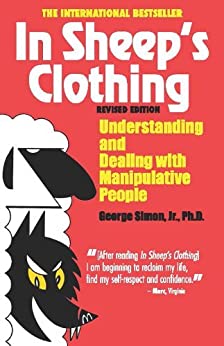Book: In Sheep’s Clothing: Understanding & Dealing with Manipulative People
This book was a GAME CHANGER for talking to my husband about his behaviors. My husband's go-to coping mechanism when faced with the truth was gas lighting – a classic behavior we hear over and over in support meetings and other groups. He didn't even realize he was doing it.
For years, I kept trying the same thing, over and over again. If I could just find the right words to make him understand, a light bulb would go off and he'd change his behavior. Nope, nada, didn't work. But I kept trying. This book opened my eyes and gave me specific examples on how to stop his manipulation and gaslighting in his tracks. A 4 hour read, and it helped with my then teenager also.
From the book:
They confront them about their behavior, only to wind up on the defensive. They get frustrated because they find themselves frequently giving in when they really wanted to stand ground, saying “yes” when they mean to say “no,” and becoming depressed because nothing they try seems to make things better. In the end, dealing with this person always leaves them feeling confused, exploited and abused.”
To guard against victimization, you must : be free of potentially harmful misconceptions about human nature and behavior; know how to correctly assess the character of others; have high self-awareness, especially regarding those aspects of your own character that might increase your vulnerability to manipulation; recognize and correctly label the tactics of manipulation and respond to them appropriately; and avoid fighting losing battles. Observing these guidelines will help anyone maintain a position of power and strength in interpersonal relationships regardless of the power tactics an aggressive or covertly aggressive person might use.”

